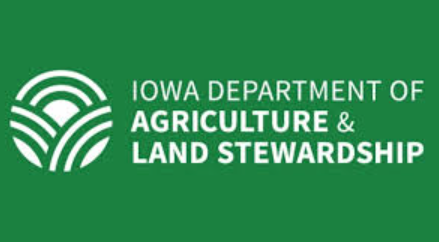Iowa Secretary of Agriculture Mike Naig announced that the Iowa Department of Agriculture and Land Stewardship is now accepting initial applications for the Resilient Food Systems Infrastructure (RFSI) grant program through March 8, 2024.
The intent of RFSI is to build resilience in the middle of the food supply chain by developing and improving markets for Iowa’s small farms and food businesses. By investing in the development of local food processing, distribution, and aggregation infrastructure, we can provide new job opportunities across our state. Iowa is receiving more than $5.2 million from the United States Department of Agriculture (USDA) Agriculture Marketing Service (AMS), which is part of a total RFSI budget of $420 million nationwide.
“As consumers increasingly look for local options and turn to Choose Iowa to find fresh food, the Resilient Food Systems Infrastructure Program and other Department initiatives are aimed at developing more markets for Iowa products,” said Secretary Naig. “By building food processing capacity and strengthening supply chain distribution, farmers and small businesses will develop more durable avenues to market their high-quality products and consumers will end up with even more Iowa choices to enjoy.”
RFSI grants will support the distribution, aggregation, processing and packaging of fresh produce, grains, dry beans and other legumes, and value-added products for wholesale markets. Grants will only fund middle supply chain activities and projects that will move products to wholesale markets such as schools, institutional buyers like hospitals and colleges, grocers, and support other intermediary markets such as food hubs, post-harvest processing facilities, or other distribution networks. Iowa is also investing in efforts to strengthen partnerships between wholesale food hubs that will improve logistics – leading to better collaboration, increased capacity and more resilient supply chains.
Iowa’s RFSI plan includes three core areas of focus:
Equipment-Only RFSI Grants
Equipment-Only Grants can range from $10,000 up to $100,000. These grants can only fund equipment, which may be new, used or refurbished. Examples include, but are not limited to, equipment that expands capacity and infrastructure for the aggregation, processing, manufacturing, storing, transporting, wholesaling, and distribution of food products. Food products include specialty crops, grains for human consumption, aquaculture, and other value-added food products. A 10 percent match is required by the applicant. The window to submit pre-proposal applications closes March 8. If selected for further consideration, a full application will be due April 15. Iowa is allocating nearly $1.5 million toward RFSI Equipment-Only Grants.
Infrastructure RFSI Grants
Infrastructure Grants will range from $100,000 up to $1 million. Grants can fund capital investments such as construction and equipment. Examples include, but are not limited to, delivery vehicles, frozen or refrigerated storage, value-added food processing equipment, building renovations, or other equipment for middle-of-the-food-supply-chain activities. Infrastructure Grants can also fund facility design or engineering, staff time, plan development, market development and systems implementation for tracking, storage, and information technology. A match is required by the applicant. The window to submit pre-proposal applications closes March 8. If selected for further consideration, a full application will be due April 15. Iowa is allocating more than $1.5 million toward RFSI Infrastructure Grants.
Supply Chain Coordination
Strengthening coordination between wholesale food hubs will improve logistics, which in turn will lead to solutions that yield better collaboration, increased capacity and more resilient supply chains. The Iowa Food Hub Managers Working Group, organized in 2015 by Iowa State University Extension and Outreach, connects the dots between producers and consumers across the statewide local food supply chain. Through RFSI investments, Iowa will develop and integrate new supply chain coordination strategies into Iowa’s hub to hub network to increase collaboration, distribution and aggregation efforts with new software and standard operating procedures. The plan also calls for hosting a Middle of the Supply Chain Buyer and Supplier Summit to build relationships between local food buyers and producers and to share innovative improvements to Iowa’s food system infrastructure. A supply chain coordinator will also help build new markets and sales for Iowa’s food hub network and producers.
RFSI is administered by the Department with operating assistance from Iowa Valley Resource Conservation and Development (IVRCD). Additional partners include Practical Farmers of Iowa and Iowa State University Extension and Outreach.

































